过去进行时和一般过去时
过去进行时和一般过去时的区别
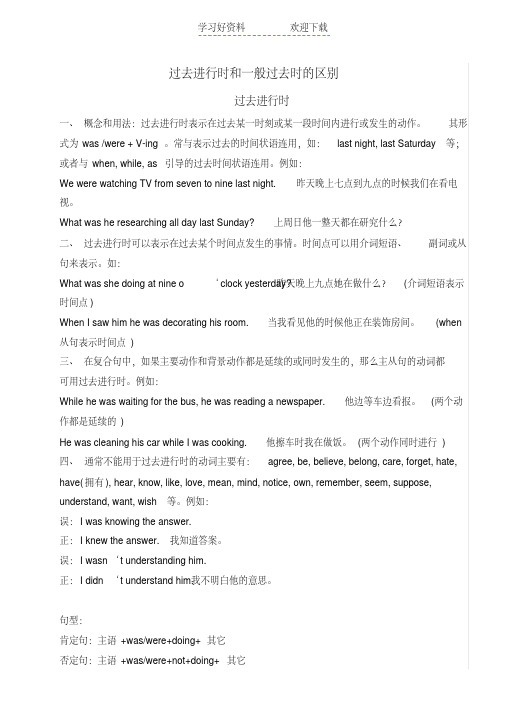
过去进行时和一般过去时的区别过去进行时一、概念和用法:过去进行时表示在过去某一时刻或某一段时间内进行或发生的动作。
其形式为was /were + V-ing。
常与表示过去的时间状语连用,如:last night, last Saturday等;或者与when, while, as引导的过去时间状语连用。
例如:We were watching TV from seven to nine last night. 昨天晚上七点到九点的时候我们在看电视。
What was he researching all day last Sunday? 上周日他一整天都在研究什么?二、过去进行时可以表示在过去某个时间点发生的事情。
时间点可以用介词短语、副词或从句来表示。
如:昨天晚上九点她在做什么?(介词短语表示What was she doing at nine o‘clock yesterday?时间点)When I saw him he was decorating his room. 当我看见他的时候他正在装饰房间。
(when 从句表示时间点)三、在复合句中,如果主要动作和背景动作都是延续的或同时发生的,那么主从句的动词都可用过去进行时。
例如:While he was waiting for the bus, he was reading a newspaper.他边等车边看报。
(两个动作都是延续的)He was cleaning his car while I was cooking. 他擦车时我在做饭。
(两个动作同时进行) 四、通常不能用于过去进行时的动词主要有:agree, be, believe, belong, care, forget, hate, have(拥有), hear, know, like, love, mean, mind, notice, own, remember, seem, suppose, understand, want, wish等。
一般过去时和过去进行时的用法、区别与联系
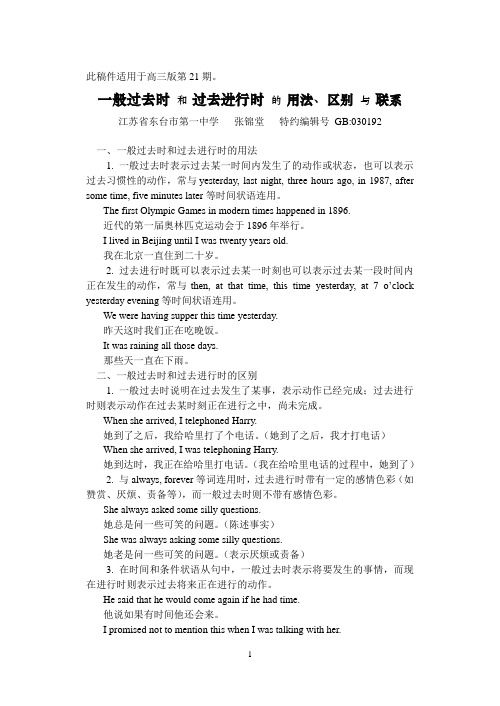
此稿件适用于高三版第21期。
一般过去时和过去进行时的用法、区别与联系江苏省东台市第一中学张锦堂特约编辑号GB:030192一、一般过去时和过去进行时的用法1. 一般过去时表示过去某一时间内发生了的动作或状态,也可以表示过去习惯性的动作,常与yesterday, last night, three hours ago, in 1987, after some time, five minutes later等时间状语连用。
The first Olympic Games in modern times happened in 1896.近代的第一届奥林匹克运动会于1896年举行。
I lived in Beijing until I was twenty years old.我在北京一直住到二十岁。
2. 过去进行时既可以表示过去某一时刻也可以表示过去某一段时间内正在发生的动作,常与then, at that time, this time yesterday, at 7 o’clock yesterday evening等时间状语连用。
We were having supper this time yesterday.昨天这时我们正在吃晚饭。
It was raining all those days.那些天一直在下雨。
二、一般过去时和过去进行时的区别1. 一般过去时说明在过去发生了某事,表示动作已经完成;过去进行时则表示动作在过去某时刻正在进行之中,尚未完成。
When she arrived, I telephoned Harry.她到了之后,我给哈里打了个电话。
(她到了之后,我才打电话)When she arrived, I was telephoning Harry.她到达时,我正在给哈里打电话。
(我在给哈里电话的过程中,她到了)2. 与always, forever等词连用时,过去进行时带有一定的感情色彩(如赞赏、厌烦、责备等),而一般过去时则不带有感情色彩。
英语的一般过去时与过去进行时区分
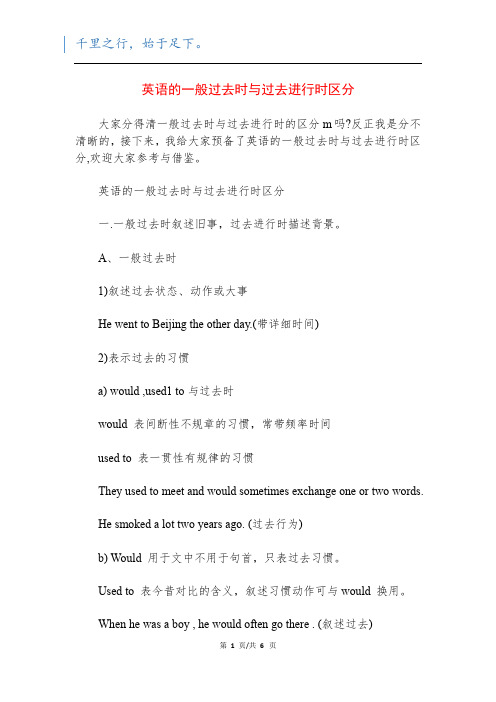
英语的一般过去时与过去进行时区分大家分得清一般过去时与过去进行时的区分m吗?反正我是分不清晰的,接下来,我给大家预备了英语的一般过去时与过去进行时区分,欢迎大家参考与借鉴。
英语的一般过去时与过去进行时区分一.一般过去时叙述旧事,过去进行时描述背景。
A、一般过去时1)叙述过去状态、动作或大事He went to Beijing the other day.(带详细时间)2)表示过去的习惯a) would ,used1 to与过去时would 表间断性不规章的习惯,常带频率时间used to 表一贯性有规律的习惯They used to meet and would sometimes exchange one or two words.He smoked a lot two years ago. (过去行为)b) Would 用于文中不用于句首,只表过去习惯。
Used to 表今昔对比的含义,叙述习惯动作可与would 换用。
When he was a boy , he would often go there . (叙述过去)She isnt what she used to be. (今昔对比)c) 表示状态时一般只用used toTom used to be fat /There used to stand a tree there. (状态)d) was (were) used to +ving表示“合适于,适应于..”He used to work at night . (“习惯”表常常)He was used to working at night. (习惯表适应)3)表示过去的经受,平行动作,依此大事用一般过去时。
He sat there and listened to the radio.(依此发生)4)表示客气委婉的语气,用于情态动词,助动词和want , wonder , hope 等How did you like the film? / Could you help me?B. 过去进行时-表示在过去某阶段或某一时刻正在发生What were you doing at 8:30 last night? (过去某时刻正在发生)-短暂性动词用过去进行时表示按方案、准备During that time he was going with us.(表示准备)-与always ,often ,usually 等连用表宠爱,厌烦等感情颜色。
英语一般过去时和过去进行时
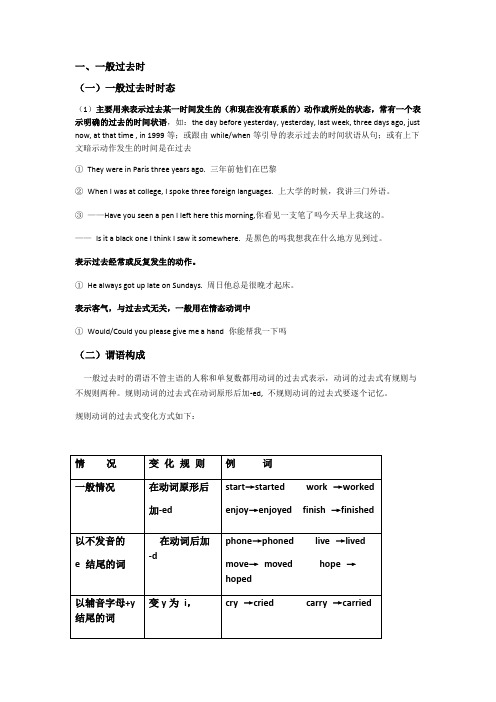
一、一般过去时(一)一般过去时时态(1)主要用来表示过去某一时间发生的(和现在没有联系的)动作或所处的状态,常有一个表示明确的过去的时间状语,如:the day before yesterday, yesterday, last week, three days ago, just now, at that time , in 1999等;或跟由while/when等引导的表示过去的时间状语从句;或有上下文暗示动作发生的时间是在过去①They were in Paris three years ago. 三年前他们在巴黎②When I was at college, I spoke three foreign languages. 上大学的时候,我讲三门外语。
③——Have you seen a pen I left here this morning,你看见一支笔了吗今天早上我这的。
——Is it a black one I think I saw it somewhere. 是黑色的吗我想我在什么地方见到过。
表示过去经常或反复发生的动作。
①He always got up late on Sundays. 周日他总是很晚才起床。
表示客气,与过去式无关,一般用在情态动词中①Would/Could you please give me a hand 你能帮我一下吗(二)谓语构成一般过去时的谓语不管主语的人称和单复数都用动词的过去式表示,动词的过去式有规则与不规则两种。
规则动词的过去式在动词原形后加-ed, 不规则动词的过去式要逐个记忆。
规则动词的过去式变化方式如下:不规则动词的过去式(举例)begin →began go →went see →saw do →did get →got come →came leave →left am →was are →were give →gave have →had think →thought一般过去时的否定式和疑问式(1)实义动词的一般过去时的否定式和疑问式要用助动词did帮助构成。
一般过去时和过去进行时的区别

目录
• 定义与概念 • 用法与语境 • 结构与形式 • 时间表达与时间点 • 常见错误与注意事项
01
定义与概念
一般过去时的定义
描述过去发生的动作 或状态,强调动作已 经完成。
句子结构通常包括助 动词did + 动词原形。
用于表达过去的经验、 事实或回忆。
过去进行时的定义
一般过去时更为常见。
时则更适用于描述过去的某个时间段内
正在发生的动作或状态。
05
常见错误与注意事项
一般过去时的常见错误
混淆时态
一般过去时和过去进行时在某些情况下可能相似,但含义不同。 常见错误是混淆两者,导致时态使用不当。
遗漏助动词
在一般过去时的句子中,有时会遗漏助动词did,导致句子结构不 完整或语法错误。
生的动作。
用于表达对过去某个动作的计划 或意图,但该动作最终可能并未
实际发生。
两者时间表达与时间点的比较
一般过去时强调动作的结果或状态在过 去的某个时间点已经完成,而过去进行 时强调动作在过去的某个时间段内正在
持续进行。
一般过去时适用于描述过去的某个具体 在表达过去的习惯或经常发生的动作时,
时间点发生的动作或状态,而过去进行
动词形式
两种时态的动词形式不同,需要注意正确使用。一般过去时的动词用过 去式,而过去进行时的动词用was/were + -ing形式。
03
从句时态
在复合句中,从句的时态应与主句保持一致。如果主句是一般过去时,
从句也应使用相应的过去时态,避免出现逻辑上的混乱。
感谢您的观看
THANKS
表达过去某个时间段内持续进行的动作或状态,例如
(完整版)英语一般过去时和过去进行时
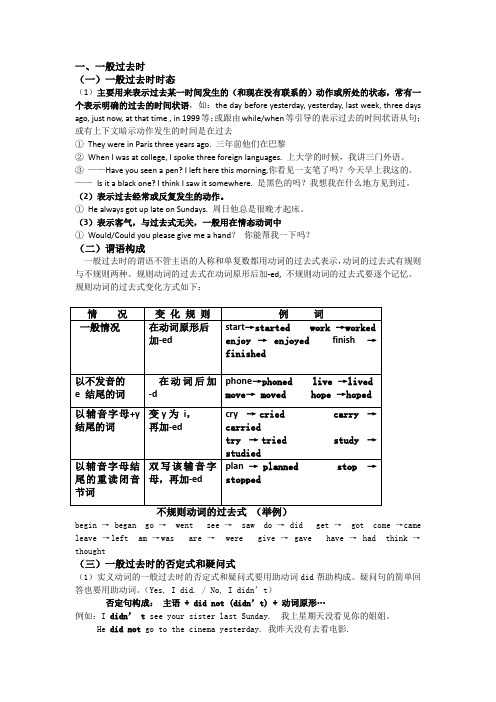
一、一般过去时(一)一般过去时时态(1)主要用来表示过去某一时间发生的(和现在没有联系的)动作或所处的状态,常有一个表示明确的过去的时间状语,如:the day before yesterday, yesterday, last week, three days ago, just now, at that time , in 1999等;或跟由while/when等引导的表示过去的时间状语从句;或有上下文暗示动作发生的时间是在过去①They were in Paris three years ago. 三年前他们在巴黎②When I was at college, I spoke three foreign languages. 上大学的时候,我讲三门外语。
③——Have you seen a pen? I left here this morning,你看见一支笔了吗?今天早上我这的。
——Is it a black one? I think I saw it somewhere. 是黑色的吗?我想我在什么地方见到过。
(2)表示过去经常或反复发生的动作。
①He always got up late on Sundays. 周日他总是很晚才起床。
(3)表示客气,与过去式无关,一般用在情态动词中①Would/Could you please give me a hand?你能帮我一下吗?(二)谓语构成一般过去时的谓语不管主语的人称和单复数都用动词的过去式表示,动词的过去式有规则与不规则两种。
规则动词的过去式在动词原形后加-ed, 不规则动词的过去式要逐个记忆。
规则动词的过去式变化方式如下:begin → began go → went see → saw do → did get → got come →came leave →left am →was are → were give → gave have → had think →thought(三)一般过去时的否定式和疑问式(1)实义动词的一般过去时的否定式和疑问式要用助动词did帮助构成。
(完整版)英语一般过去时和过去进行时
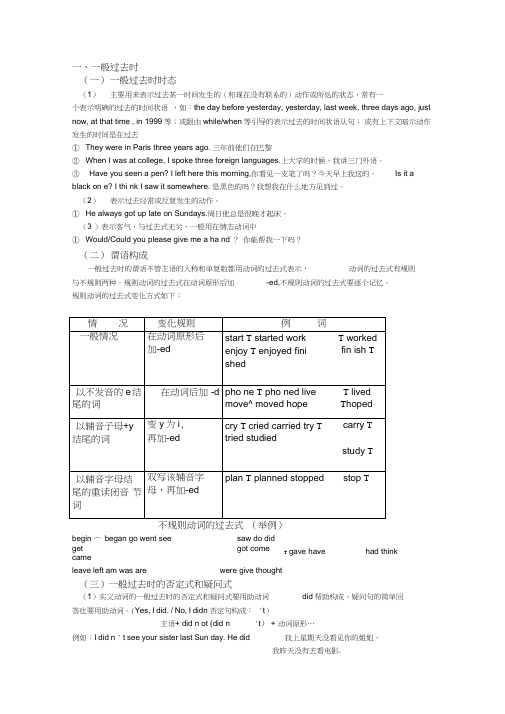
一、一般过去时 (一) 一般过去时时态(1) 主要用来表示过去某一时间发生的(和现在没有联系的)动作或所处的状态,常有一个表示明确的过去的时间状语 ,如:the day before yesterday, yesterday, last week, three days ago, justnow, at that time , in 1999等;或跟由while/when 等引导的表示过去的时间状语从句; 或有上下文暗示动作发生的时间是在过去① They were in Paris three years ago. 三年前他们在巴黎② When I was at college, I spoke three foreign Ianguages.上大学的时候,我讲三门外语。
③ Have you seen a pen? I left here this morning,你看见一支笔了吗?今天早上我这的。
Is it ablack on e? I thi nk I saw it somewhere. 是黑色的吗?我想我在什么地方见到过。
(2) 表示过去经常或反复发生的动作。
① He always got up late on Sundays.周日他总是很晚才起床。
(3 )表示客气,与过去式无关,一般用在情态动词中① Would/Could you please give me a ha nd ? 你能帮我一下吗?(二) 谓语构成一般过去时的谓语不管主语的人称和单复数都用动词的过去式表示, 动词的过去式有规则与不规则两种。
规则动词的过去式在动词原形后加 -ed,不规则动词的过去式要逐个记忆。
规则动词的过去式变化方式如下:不规则动词的过去式 (举例)begin 宀 began go went see saw do did get got comecameleave left am was arewere give thought(三)一般过去时的否定式和疑问式(1)实义动词的一般过去时的否定式和疑问式要用助动词 did 帮助构成。
过去进行时与一般过去时的区别
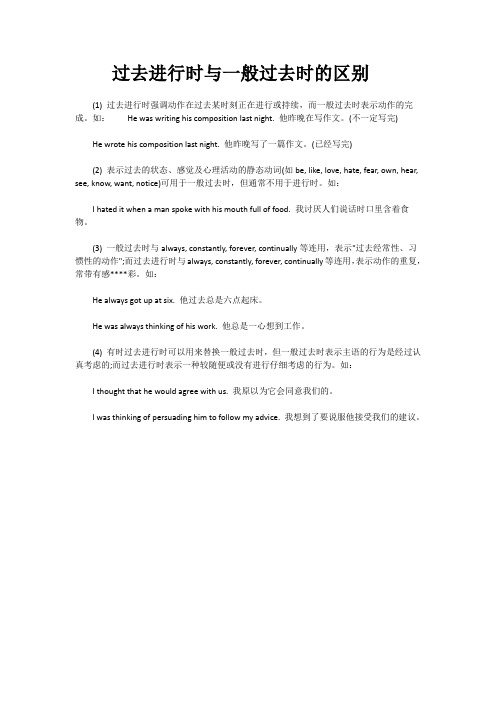
过去进行时与一般过去时的区别(1) 过去进行时强调动作在过去某时刻正在进行或持续,而一般过去时表示动作的完成。
如:He was writing his composition last night. 他昨晚在写作文。
(不一定写完)He wrote his composition last night. 他昨晚写了一篇作文。
(已经写完)(2) 表示过去的状态、感觉及心理活动的静态动词(如be, like, love, hate, fear, own, hear, see, know, want, notice)可用于一般过去时,但通常不用于进行时。
如:I hated it when a man spoke with his mouth full of food. 我讨厌人们说话时口里含着食物。
(3) 一般过去时与always, constantly, forever, continually等连用,表示"过去经常性、习惯性的动作";而过去进行时与always, constantly, forever, continually等连用,表示动作的重复,常带有感****彩。
如:He always got up at six. 他过去总是六点起床。
He was always thinking of his work. 他总是一心想到工作。
(4) 有时过去进行时可以用来替换一般过去时,但一般过去时表示主语的行为是经过认真考虑的;而过去进行时表示一种较随便或没有进行仔细考虑的行为。
如:I thought that he would agree with us. 我原以为它会同意我们的。
I was thinking of persuading him to follow my advice. 我想到了要说服他接受我们的建议。
- 1、下载文档前请自行甄别文档内容的完整性,平台不提供额外的编辑、内容补充、找答案等附加服务。
- 2、"仅部分预览"的文档,不可在线预览部分如存在完整性等问题,可反馈申请退款(可完整预览的文档不适用该条件!)。
- 3、如文档侵犯您的权益,请联系客服反馈,我们会尽快为您处理(人工客服工作时间:9:00-18:30)。
语法练习卷(过去进行时和一般过去时)
考生姓名学号
一、填空题
1. It was warm,so I _______(take) off my coat.
2. Jane ___________(wait) for me when I ______(arrive). 3.Sue wasn’t hungry, so she _________(eat) anything. 4. My brother came into the bedroom while I _________(dance). 5. _______ he ________(lie) on the ground at nine yesterday evening
6. What _____ Jim __________(write) when the teacher came in
7. Mike and I ________(play) baskteball at that time yesterday afternoon.
8. My brother ______(fall) while he _______(ride) his bicycle and hurt himself.9. I first met Lisa three years ago. She ______(work) at a radio shop at the time.
I arrived at his office , he ______ on the phone.(speak)
二、选择题
1. When I saw , he __________.
A. is working
B. worked
C. was working
2. You had a good time at school, __________ you
A. hadn't
B. didn't
C. weren't
3. __________ when the telephone rang
A. Were you sleeping
B. Did you sleep
C. Were sleeping
4. , when __________ the blog on the Web
A. were you begin
B. began
C. did you begin
5. You __________ me, did you
A. understood
B. weren't understanding
C. didn't understand
6. When __________ yesterday morning
A . you got up B. did you get up C. were you getting up
7. While I __________ to work, I saw an accident.
A. drove
B. was driving
C. did drive
8. __________ well on this test
A. Did you
B. Were you
C. Did you do
9. —Did you tidy your room — No, I was going to tidy my room but I ________ visitors.
A. had
B. have
C. have had
D. will have
10. They_____ two free tickets to Canada, otherwise they’d never have been able to afford to go.
A. had got
B. got
C. have got
D. get 11—Ouch! You hurt me!
—I am sorry. But I ______any harm. I _______to drive a rat out. A. didn’t mean; tried B. don’t mean; am trying
C. haven’t meant; tried
D. didn’t mean; was trying
12 —I saw Jane and her boyfriend in the park at eight yesterday evening.
—Impossible. She _______TV with me in my home then.
A. watched
B. had watched
C. would watch
D.
was watching
13 —Did you see a man in black pass by just now
—No, sir. I ________ a newspaper. A. read reading C. would read D. am reading
14. I _______there little more than a week when I set to work with the scientist.
A. would be
B. have been
C. had been
D.
will be
15. —Has your father returned from Africa yet
—Yes, but he _____ here for only three days before his company sent him to Australia.
A. was
B. has been
C. will be
D. would be
16. John, a friend of mine, who got married only last week, spent $3,000 more than he _______ for the wedding.
A. will plan
B. has planned
C. would plan
D. had planned
17. The young girl sitting next to me on the plane was very nervous. She ____before.
A. hasn't flown
B. didn't fly
C. hadn't flown
D. wasn't flying
18. I______ in London for many years, but I’ve never regretted my final decision to move back to China.
A. lived
B. was living
C. have lived
D. had lived
三、按要求进行句型转换。
1. We were having a PE class at four yesterday afternoon.(改为否定句)
We _______ ________ a PE class at four yesterday afternoon.
2. Kate was reviewing her lessons at eight last night. (改为一般疑问句,做肯,否回答,对划线部分提问)
____________________________________________________
____________________________________________________
3. He ran in the park .(用at this time yesterday改写)____________________________________________________
4. They were playing computer games at nine last night.(对划线部分提问)
____________________________________________________
5. I was reading a novel at three yesterday afternoon.(对划线部分提问)
____________________________________________________ 四、根据汉语提示完成句子。
1.他们那时不在打排球。
They _______ _______ volleyball at that time.
2.当你回来时,他在看电视吗
_______ he _______ Tv when you came back
3.昨天中午他在哪里等你
_______ _______ he _______ for you at noon yesterday
4.当我离开时,他正在做家庭作业。
He ________ ________ his homework when I left.
5.正当他们扫地的时候,老师进来了。
While they_______ _______ the floor , the teacher came in.。
